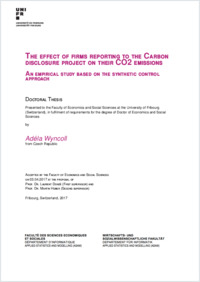The effect of firms reporting to the Carbon disclosure project on their CO2 emissions. : An empirical study based on the synthetic control approach
- Wyncoll, Adéla
- Donzé, Laurent (Degree supervisor)
-
2017
1 ressource en ligne (189 p.)
Thèse de doctorat: Université de Fribourg, 2017
English
Whoever is not “green” is not “in”. That’s the latest trend of the market. This environmental movement pushes the companies to review their policies and assure a sustainable development by reducing their Carbon Dioxide (CO2) emissions and use of natural resources or in general show an eco-friendly behaviour. The objective of our work is to assess the pertinence of green policy introduction at the business level. For our analysis, we are using unique data sets of the firm’s CO2 emissions. We built our data by adding several firms’ characteristics to an initial database provided by South Pole Group. Based on particular companies’ specificities we were then able to select the suitable treated and control groups. Carbon Disclosure Project (CDP) is a non-profit organisation allowing companies to report and manage their emissions, climate risk and reduction goals. And in our study, we intend to evaluate whether signing up to the CDP has a positive effect on the firms’ emissions. It is a typical causal effect evaluation problem that we solve using a relatively new approach called “Synthetic Control Method (SCM)” introduced by Abadie and Gardeazabal (2003). The objective of this method is to build the synthetic control unit, which is the weighted combinations of available control units that most closely resemble the treated unit before the treatment in term of different characteristics. This synthetic control unit allows us to define the counterfactual outcome, that is then compared to the actual outcome to evaluate the treatment effect. We chose the synthetic control method because it allows researchers to analyse phenomena that occur in a limited population or that apply to only a small number of firms, which is ideally suited to our problematic. Almer and Winkler (2013) used this method in environmental problematic, but to our knowledge, it has never been applied to evaluate firms’ politics, and indeed we will use this approach to analyse the environmental programme at a company level. To complete the investigation of the general impact of this program on firms’ emissions, we also focus on three geographic regions: the United States (US), the United Kingdom (UK), and the rest of European Union (EU).
- Faculty
- Faculté des sciences économiques et sociales et du management
- Language
-
- English
- Classification
- Economics
- Notes
-
- Ressource en ligne consultée le 10.08.2017
- License
-
License undefined
- Identifiers
-
- RERO DOC 305017
- URN urn:nbn:ch:rero-002-116501
- RERO R008689162
- Persistent URL
- https://folia.unifr.ch/unifr/documents/305844
Statistics
Document views: 342
File downloads:
- Texte intégral: 217
